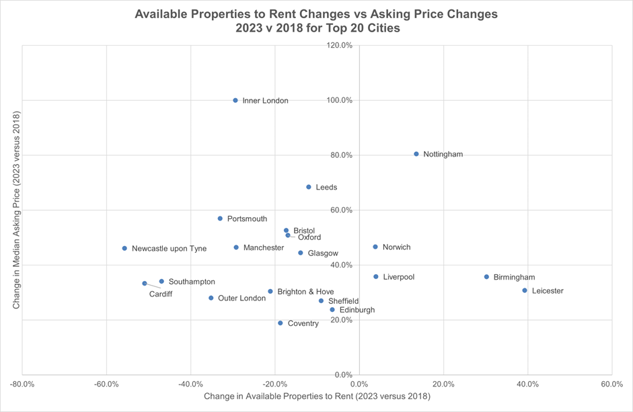Retail Trust’s Health of Retail Report 2023 – Cost of Living Is One of The Main Causes of Stress For Retail Workers

We partnered with the Retail Trust on their latest Health of Retail report to demonstrate how the rise in rental prices is contributing to the stress of 52% of retail workers and consumers.
Based on our findings, 50 out of the 70 cities in the UK have fewer properties available to rent than this time last year. Additionally, there’s been an increase in demand due to a reduction in properties for sale. As a result of both factors, rental prices have gone through the roof.
The drop of properties to rent has decreased by 7.3% in the last year and a massive 29.4% in the last five years, causing 62 out of the 70 cities to experience a median rental price increase. The median price pcm to rent a property across the UK now sits at £950 pcm, an increase of 30% in the last year and a staggering 100% in the last 5 years.

Breaking rental prices down; 40 cities experienced increases above 10% in the last year and prices in Inner London rose by an eye-watering 30%. Cardiff followed suit in third position with a 22% rental increase since 2022; 33% since 2018 and a median asking price rent of £1,100 pcm.
Taking this into account and comparing this with the median household disposable income in the UK sitting at £32,300, it means that a person renting an average property is spending 35% of their net income on rent.
Therefore, it’s no surprise that the Retail Trust report found that the biggest contributing factor to the deterioration in retail workers’ mental well-being is the cost-of-living crisis. Over half (52%) of retail employees said this has impacted their mental health. Over a third (36%) stated that financial pressures are contributing to their problems and a massive nine out of ten employees declared that they’re affected. What’s more over a fifth (21%) are now struggling to meet their monthly outgoings.
This rise in rent, coupled with the increase in bills and general outgoings is putting enormous pressure on those in lower-paid jobs, which as we know, is a large cohort of people who work in retail. The impact this financial pressure is having on people’s well-being is clear to see in this report and makes for a sobering read. The statistics are startling and really highlight the importance of a solution-based approach to the cost-of-living crisis. It’s important for leaders to be thinking progressively about how they can help support their colleagues through the crisis and subsequent stresses it brings with it. Whether that is by listening to their staff on what they can do to support them, providing more flexible working patterns or giving further financial incentives. Progressive employers will think beyond the usual approaches and this report should help provide inspiration and ideas for them to do so.
The underlying cost-of-living stress is underpinned by the lack of rental availability and costs skyrocketing across the UK. This continued outlay of salary on rent is having a negative impact on the population’s well-being, specifically those in lower-paid jobs.
Download the full report here.